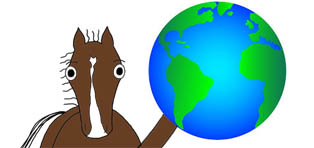abc.net.au/am/ - Full transcript
AM - Saturday, 10 November , 2007 08:18:00
Reporter: David Margan
ELIZABETH JACKSON: As the thundering of the Melbourne Cup hooves fades into the distance Australia's racing industry must again confront the enormous cost of the horse flu outbreak.
No one really knows how many horses there are in Australia, and no one is quite sure just how much equine influenza will ultimately cost, but it's already been estimated to be in the hundreds of millions of dollars, and the cost isn't just financial.
David Margan filed this report.
RACE CALLER: Ms Bustle flying home, it'll be too late, and Accelerator�
JOHN MESSARA: Perhaps the worst disaster that's befallen us in the last 20 or 30 years because of the disruption it's caused.
DAVID MARGAN: John Messara, principal of Arrowfield Stud and one of the kings of the track.
JOHN MESSARA: It's estimated by the Australian Bureau of Statistics that it's costing racing $3-million a day, and it's costing the breeding industry $1.3-million a day.
DAVID MARGAN: But there is another half of the horse industry that's been almost completely ignored, whose losses have been just as great but whose heartbreak has been far more widespread. We're talking about the performance and pleasure horse sector that includes a plethora of activities from pony clubs to Olympic equestrian.
PETER TOFT: It's hard to put a definitive amount on it, but you're talking about millions and millions of dollars, if not billions of dollars. I mean, it's been an amazing catastrophe.
DAVID MARGAN: Peter Toft breeds endurance horses, and as chairman of the fledgling Queensland Pleasure and Performance Horse Association, puts his market sector's losses at $5-million a day.
PETER TOFT: Every day it goes on the problems become deeper and the chances of recovery of our industry become much more protracted.
DAVID MARGAN: John Wicks is one of Australia's foremost reining horse trainers and riders, but his growing business has ground to a halt.
JOHN WICKS: You know, the bills still keep coming in.
DAVID MARGAN: So, what are you doing to make ends meet?
JOHN WICKS: Well, I'm doing a little bit of gardening, a bit of fencing. Anything I possibly can at the moment.
DAVID MARGAN: Another cost has been confidence.
John Messara.
JOHN MESSARA: The Thoroughbred Owners Association did a survey of their membership to see who would buy horses in 2008, post EI, and they got 100 per cent negative response. That's a frightening thing.
DAVID MARGAN: The spread of the virus and government's response to it has also fractured relations within the great horse family. The thoroughbred sector, using its great well-organised influence, had restrictions on horse movements modified so their breeding season could get underway, a concession not extended to anyone else. And it was also they who got the first vaccinations.
Peter Toft:
PETER TOFT: Eighty five per cent of our industry is made up of microbusinesses. They're people that employ less than five people and those sort of people are very good for the Australian economy. Collectively, they made up billions and billions of dollars.
DAVID MARGAN: And they've been ignored thus far?
PETER TOFT: Totally ignored.
DAVID MARGAN: Toft further claims that over half the horse industry has got almost nothing from the nearly $100-million so far given in financial assistance by the Commonwealth, Queensland and New South Wales Governments.
ELIZABETH JACKSON: David Margan with that report. And you can watch David's full story on ABC TV's Landline program tomorrow at midday.
Friday, November 16, 2007
Austr: Recreation industry counts cost of horse flu - Nov 10 2007
Subscribe to:
Post Comments (Atom)
Saudi Arabia: 71 Countries represented at the Al Fursan Endurance AlUla this weekend
http://endurance.net/international/SaudiArabia/2026WorldEnduranceChampionship/ February 6 2026 From February 6-8, AlUla (KSA) will once b...

-
Inside.fei.org 17 December 2020 The FEI Board took a series of key decisions on allocation, cancellation, and reopening of bids for FEI C...
-
Michael Pollard was one of the four winners of the 2025 Mongol Derby (Kathy Gabriel) Ca.News.yahoo.com - Full Article Annabel Grossman ...
-
BNA.bh - Full Article 17 Aug 2025 London, Aug. 17 (BNA): His Highness Shaikh Nasser bin Hamad Al Khalifa, Representative of His Majes...


No comments:
Post a Comment